人教版新目标九年级英语unti9重难点讲解
人教新目标九年级英语全册素材:Unit9 分析(2)

教学内容分析
定语从句是课标规定的必须掌握的知识,各种版本的教材中均有不同的体现。
外研社的新标准英语九年级Moduel9 和Moduel10,仁爱英语九年级Unit5 ,人教新目标九年级unit9都是定语从句的学习。
本单元为人教新目标九年级(新版)Unit9.本单元以music为中心话题,让学生学会由关系代词that and who引导的定语从句谈论自己所喜爱,学习表达自己的爱好。
话题从音乐扩展到生活的其他内容,和学生的生活联系紧密,学生会有参与的积极性。
而语法核心项目定语从句是初中阶段必需了解的一种句法结构。
本单元将此语法的学习渗透到话题中步步递进展开来达到学习目的,完成学习任务。
本课时继续学习表达个人喜好,包括书籍,电影,音乐,歌曲的进行简单的评论,提高审美水平。
主要通过听力训练学生获取信息的能力,通过加工整理写一段表达自己喜好的文字。
人教版九年级英语Unit9单元重难点语法突破(含答案)
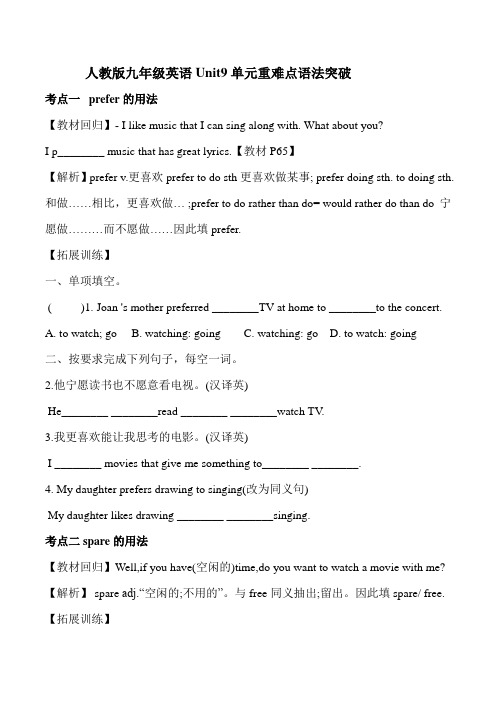
人教版九年级英语Unit9单元重难点语法突破考点一prefer的用法【教材回归】- I like music that I can sing along with. What about you?I p________ music that has great lyrics.【教材P65】【解析】 prefer v.更喜欢 prefer to do sth更喜欢做某事; prefer doing sth. to doing sth.和做……相比,更喜欢做… ;prefer to do rather than do= would rather do than do宁愿做………而不愿做……因此填 prefer.【拓展训练】一、单项填空。
( )1. Joan 's mother preferred ________TV at home to ________to the concert.A. to watch; goB. watching: goingC. watching: goD. to watch: going二、按要求完成下列句子,每空一词。
2.他宁愿读书也不愿意看电视。
(汉译英)He________ ________read ________ ________watch TV.3.我更喜欢能让我思考的电影。
(汉译英)I ________ movies that give me something to________ ________.4. My daughter prefers drawing to singing(改为同义句)My daughter likes drawing ________ ________singing.考点二 spare的用法【教材回归】Well,if you have(空闲的)time,do you want to watch a movie with me? 【解析】 spare adj.“空闲的;不用的”。
(完整版)新版新目标英语九年级unit9知识点总结.docx
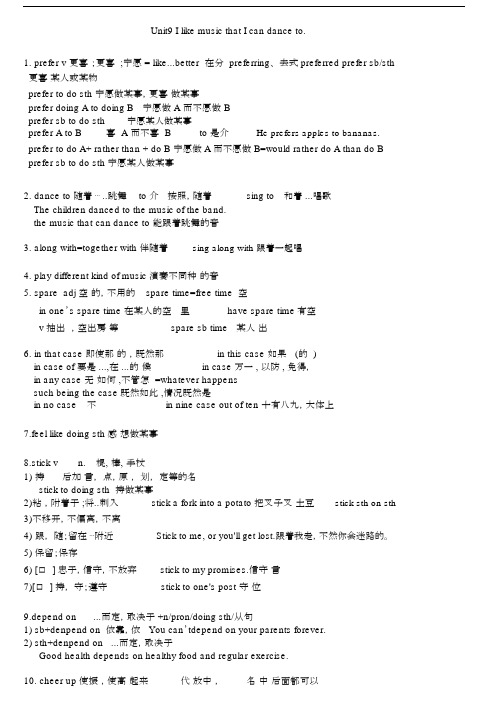
Unit9 I like music that I can dance to.1.prefer v 更喜;更喜 ;宁愿 = like...better 在分 preferring、去式 preferred prefer sb/sth 更喜某人或某物prefer to do sth 宁愿做某事,更喜做某事prefer doing A to doing B宁愿做A而不愿做Bprefer sb to do sth宁愿某人做某事prefer A to B喜A而不喜B to 是介He prefers apples to bananas. prefer to do A+ rather than + do B 宁愿做 A 而不愿做 B=would rather do A than do B prefer sb to do sth 宁愿某人做某事2. dance to 随着⋯ ..跳舞to 介按照,随着sing to和着...唱歌The children danced to the music of the band.the music that can dance to 能跟着跳舞的音3. along with=together with 伴随着sing along with 跟着一起唱4.play different kind of music 演奏不同种的音5.spare adj 空的,不用的 spare time=free time 空in one’s spare time 在某人的空里have spare time有空v 抽出,空出房等spare sb time 某人出6. in that case 即使那的,既然那in this case 如果 (的 )in case of 要是 ...,在 ...的候in case 万一 , 以防 , 免得,in any case 无如何 ,不管怎 =whatever happenssuch being the case既然如此 ,情况既然是in no case不in nine case out of ten 十有八九,大体上7.feel like doing sth 感想做某事8.stick v n.棍,棒,手杖1)持后加言,点,原,划,定等的名stick to doing sth 持做某事2)粘,附着于 ;将..刺入stick a fork into a potato 把叉子叉土豆stick sth on sth3)不移开,不偏离,不离4)跟,随;留在⋯附近Stick to me, or you'll get lost.跟着我走,不然你会迷路的。
人教版英语九年级unit9 词汇短语语法及知识难点汇总
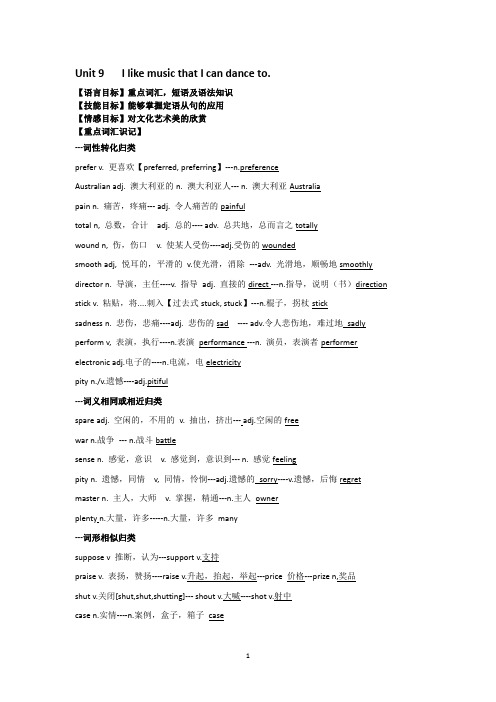
名称 先行词 关系词
定语从句(翻译为:......的.......)
先行词 被定语从句修饰的名词或代词, 叫先行词, 而定语从句位于先行词的后面。 关系词 用来引导定语从句的词叫做关系词。
3
●分类讲解 (一)当先行词为人时的情况
1)He is a person. The person does what he says. (合并句子) He is a person that/who does what he says. (person 是先行词, that/who 引导的定语从句,在 从句中作主语) 2)He is the man. I have been looking for th He is the man who / whom I have been looking for. (the man 是先行词,who/whom 引导定语从句, 在从句中作宾语) 【归纳】 当先行词为人时,用关系词 who/whom/that 引导定语从句,关系词 who/that 在从句中 可以作主语或宾语,whom 在从句中只做宾语。 【练一练】 ①He is the boy_____ often helps old people cross the busy street. ②I know these children______ I see play soccer on the playground on Sundays. (二)当先行词为事或物的情况 1)The cat is ill. The cat was bought yesterday.(合并句子) The cat that/which was bought yesterday is ill. (cat 是先行词, that/which 引导定语从句并且在从句中作主语) 2)I want to take away the book . You showed me the book yesterday. I want to take away the book which/that you showed me yesterday. (book 是先行词, which/that 引导定语从句在从句中作宾语) 【归纳】 当先行词为事或物时,用关系词 that/which 引导定语从句,关系词在从句中做主语或宾 语,一般情况下可以互换】 【练一练】 ①I bought the computer _____ is the cheapest in the store. ②I like the story _____ Mr.Wang told us yesterday in class. (三)whose 做关系词引导从句中的情况 1)I saw a woman. Her bag was stolen.(合并句子) I saw a woman whose bag was stolen. 2)I am reading the book. Its cover is red.(合并句子) I am reading the book whose cover is red. 【归纳】 当先行词为人,事或物,并且关系词在从句中做定语时,用关系词 whose 引导定语从句。 【练一练】 ① I’m talking with the girl_____ father is a doctor in the hospital. ② We saw the house ______ windows face the south.
人教班九年级unit9知识点
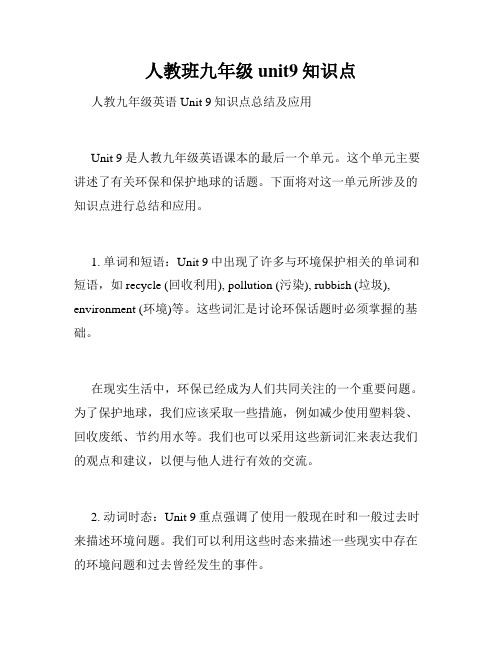
人教班九年级unit9知识点人教九年级英语Unit 9知识点总结及应用Unit 9 是人教九年级英语课本的最后一个单元。
这个单元主要讲述了有关环保和保护地球的话题。
下面将对这一单元所涉及的知识点进行总结和应用。
1. 单词和短语:Unit 9中出现了许多与环境保护相关的单词和短语,如recycle (回收利用), pollution (污染), rubbish (垃圾), environment (环境)等。
这些词汇是讨论环保话题时必须掌握的基础。
在现实生活中,环保已经成为人们共同关注的一个重要问题。
为了保护地球,我们应该采取一些措施,例如减少使用塑料袋、回收废纸、节约用水等。
我们也可以采用这些新词汇来表达我们的观点和建议,以便与他人进行有效的交流。
2. 动词时态:Unit 9重点强调了使用一般现在时和一般过去时来描述环境问题。
我们可以利用这些时态来描述一些现实中存在的环境问题和过去曾经发生的事件。
例如,我们可以说:"People throw rubbish everywhere, which pollutes the environment." (人们到处乱扔垃圾,这污染了环境。
) 或"Last year, there was a big fire in the forest near my hometown." (去年,在我家乡附近的森林里发生了一场大火。
)这些时态的正确使用可以让我们更加生动地描述环境问题,有效地与他人交流。
3. 句子结构:在Unit 9中,出现了一些复杂的句子结构,如宾语从句,定语从句和条件句等。
这些结构的使用可以让我们的句子更加丰富多样。
例如,我们可以说:"I believe that if everyone recycles, we can make the world a better place." (我相信,如果每个人都回收利用,我们可以使世界变得更美好。
新人教版九年级英语unit9重点知识点
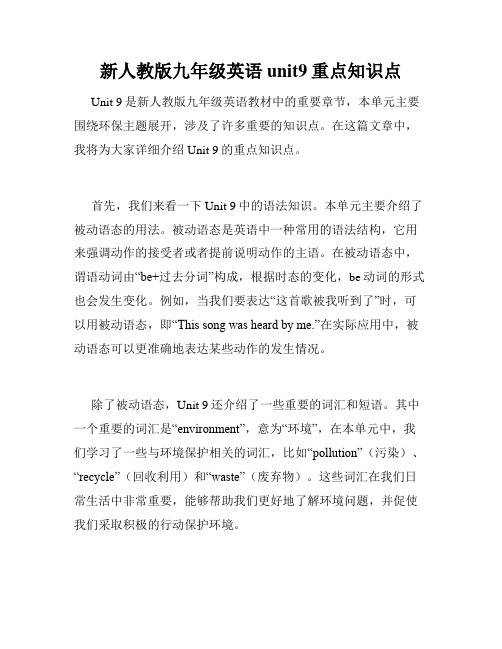
新人教版九年级英语unit9重点知识点Unit 9是新人教版九年级英语教材中的重要章节,本单元主要围绕环保主题展开,涉及了许多重要的知识点。
在这篇文章中,我将为大家详细介绍Unit 9的重点知识点。
首先,我们来看一下Unit 9中的语法知识。
本单元主要介绍了被动语态的用法。
被动语态是英语中一种常用的语法结构,它用来强调动作的接受者或者提前说明动作的主语。
在被动语态中,谓语动词由“be+过去分词”构成,根据时态的变化,be动词的形式也会发生变化。
例如,当我们要表达“这首歌被我听到了”时,可以用被动语态,即“This song was heard by me.”在实际应用中,被动语态可以更准确地表达某些动作的发生情况。
除了被动语态,Unit 9还介绍了一些重要的词汇和短语。
其中一个重要的词汇是“environment”,意为“环境”,在本单元中,我们学习了一些与环境保护相关的词汇,比如“pollution”(污染)、“recycle”(回收利用)和“waste”(废弃物)。
这些词汇在我们日常生活中非常重要,能够帮助我们更好地了解环境问题,并促使我们采取积极的行动保护环境。
另外一个重要的短语是“take action”,意为“采取行动”。
在本单元中,我们学习了“take action to do sth.”的用法,表示采取具体的行动来解决问题。
例如,我们可以说“we should take action to reduce po llution”(我们应该采取行动来减少污染)。
这个短语的使用可以帮助我们在写作和口语表达中更具有说服力。
除了语法和词汇,Unit 9还介绍了一些重要的口语表达和交际用语。
例如,当我们询问别人是否关心环境问题时,可以使用句型“What do you think of...?”或者“What's your opinion on...?”。
当然,我们还可以用其他的方式表达相同的意思,这需要根据具体情况和语境进行灵活运用。
人教新目标版九年级全册英语知识点Unit 9
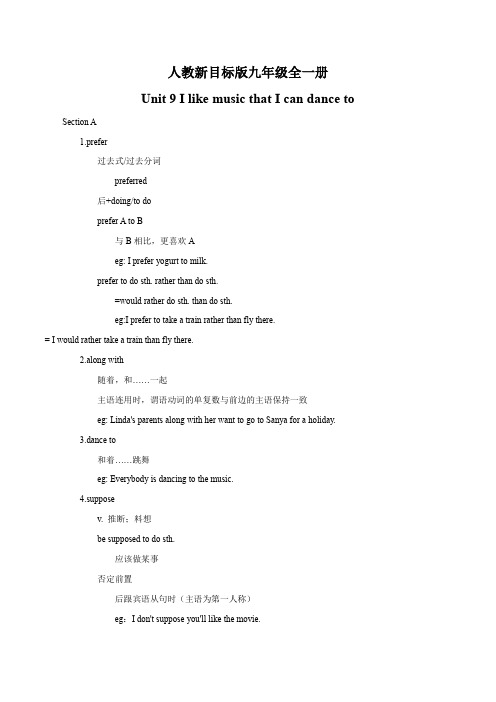
人教新目标版九年级全一册Unit 9 I like music that I can dance to Section A1.prefer过去式/过去分词preferred后+doing/to doprefer A to B与B相比,更喜欢Aeg: I prefer yogurt to milk.prefer to do sth. rather than do sth.=would rather do sth. than do sth.eg:I prefer to take a train rather than fly there.= I would rather take a train than fly there.2.along with随着,和……一起主语连用时,谓语动词的单复数与前边的主语保持一致eg: Linda's parents along with her want to go to Sanya for a holiday.3.dance to和着……跳舞eg: Everybody is dancing to the music.4.supposev. 推断;料想be supposed to do sth.应该做某事否定前置后跟宾语从句时(主语为第一人称)eg:I don't suppose you'll like the movie.5.spareadj.空闲的;不用的v.抽出;留出句型in one's spare time在某人的业余时间里=in one's free timespare some time for sb.为某人留出一些时间6.in that case既然那样case短语in case of 如果...in any case 无论如何in case 以防万一in this case 在这种情况下7.stick to坚持;固守后+n./pron./V.ingv.粘贴,将……刺入过去式/过去分词:stuckeg:The two stamps have stuck together.n.棍棒,树枝等eg: He picked up some sticks to make a fire.8.plenty of大量;充足=lots of辨析plenty of接可数不可数皆可a number of接可数名词复数an amount of接不可数名词9.mindv.介意mind (one's) doing sth.介意某人做某事。
人教版新目标英语九年级Unit单元知识点小结
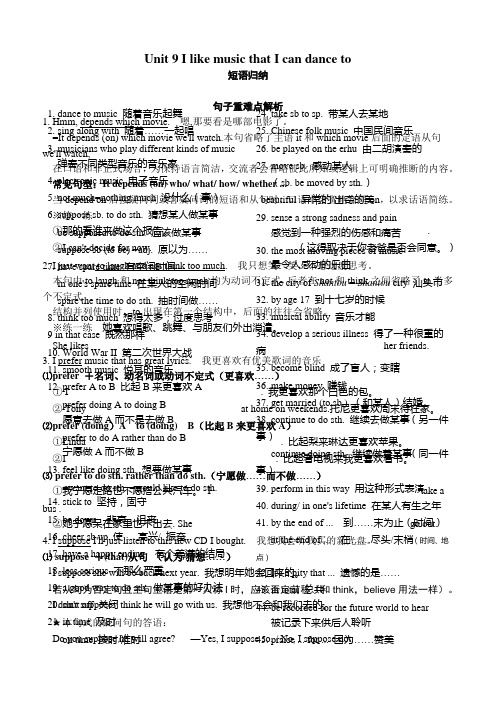
Unit 9 I like music that I can dance to短语归纳句子重难点解析 1. Hmm, depends which movie. 嗯,那要看是哪部电影了。
=It depends (on) which movie we'll watch.本句省略了主语it 和which movie 后面的定语从句we'll watch, 在口语和非正式场合,为保持语言简洁,交流者会省略彼此所知或逻辑上可明确推断的内容。
常见句型:It depends (on) who/ what/ how/ whether ...当depend on 后接疑问词或含疑问词的短语和从句时,口语中会省略介词on ,以求话语简练。
※练一练 ①那的看谁来做这个报告。
___________________________________________________. ②I can't decide for now. ___________________________(这得取决于你老爸是否会同意。
) 2. I just want to laugh and not think too much. 我只想笑一笑,不想过度思考。
本句中to laugh 和not think too much 均为动词不定式,后者在not 和think 之间省略了to.当多个不定式 结构并列使用时,to 出现在第一个结构中,后面的往往会省略。
※练一练 她喜欢唱歌、跳舞、与朋友们外出消遣。
She likes __________________________________________________________ her friends. 3. I prefer music that has great lyrics. 我更喜欢有优美歌词的音乐 ⑴prefer +名词、动名词或动词不定式(更喜欢……) ① I ______________________________________. 我更喜欢那个白色的包。
人教版新目标九年级英语unti9重难点讲解

九年级新目标Unit9重点讲解1. They’re used for seeing in the dark.搭配:be used for…表示“被用来做……”,介词for表示目的和用途,后面接名词或动词-ing形式。
例如:Wood can be used for making paper.扩展:(1) be used as …表示“被用作……”,介词as意思是“作为”的意思,其后一般接名词,强调使用的工具及手段。
例如:This book can be used as a textbook.(2) be used by…表示“被……使用”,by后接动作的执行者。
例如:This kind of machine is used by farmers for getting in crops.农民们用这种机器来收割庄稼。
(3) be/ get used to doing sth. 表示“习惯做某事”例如:I am used to getting up early every day.(4) used to do sth. 表示“过去常常……;曾经……”例如:I used to be a teacher.练习:①A knife can cutting bread.A. be used forB. be used toC. be used byD. be used as②This kind of plant can animal food.A. be used forB. be used toC. be used byD. be used as2. I think the most helpful invention is the light bulb.例如:helpful是由名词help加上-ful后缀构成的形容词,意为“有帮助的”,类似的形容词还有:thank — thankful (感激的) wonder — wonderful (令人惊奇的)success — successful (成功的) beauty — beautiful (美丽的)翻译:当你写作业的时候,一定要仔细点。
人教新目标九年级unit9知识点
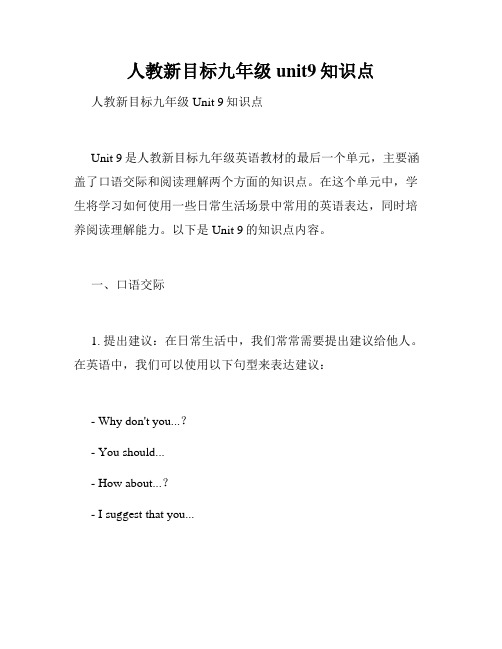
人教新目标九年级unit9知识点人教新目标九年级Unit 9知识点Unit 9是人教新目标九年级英语教材的最后一个单元,主要涵盖了口语交际和阅读理解两个方面的知识点。
在这个单元中,学生将学习如何使用一些日常生活场景中常用的英语表达,同时培养阅读理解能力。
以下是Unit 9的知识点内容。
一、口语交际1. 提出建议:在日常生活中,我们常常需要提出建议给他人。
在英语中,我们可以使用以下句型来表达建议:- Why don't you...?- You should...- How about...?- I suggest that you...2. 表达兴趣和不感兴趣:当我们想表达对某件事情的兴趣或者不感兴趣时,我们可以使用以下句型:- I'm interested in...- I can't stand...- I'm not really into...- I'm crazy about...3. 表达喜好和厌恶:当我们想表达自己对某种事物的喜好或者厌恶时,我们可以使用以下句型:- I like...- I love...- I enjoy...- I hate...- I can't stand...二、阅读理解1. 根据上下文推测词义:在阅读理解中,我们有时候会遇到一些生词,但是可以通过上下文的提示来推测出它们的意思。
我们可以根据上下文词语的功能、词义的关系以及实际情境来进行推测。
2. 根据文章内容回答问题:在阅读理解中,文章通常会围绕一个主题展开介绍。
我们可以通过仔细阅读文章内容,理解主旨和细节信息,从而回答相关问题。
3. 利用标题和图片预测文章内容:阅读理解中的标题和图片通常会提供一些线索来预测文章的内容。
在阅读前,我们可以先读标题和观察图片,猜测文章的主题和大致内容,有助于我们更好地理解整篇文章。
通过掌握上述口语交际和阅读理解的知识点,我们可以更加流利地进行日常生活中的英语交流,并且能够更好地理解和解读各类英语文章。
人教版九年级英语Unit9知识点梳理及语法讲义(学生版)

九年级英语Unit 9知识点与语法精讲精练词汇梳理(一)完成单词梳理:名词:1. 歌词 2. 导演;部门 3. 战争;战争状态4. 情况;实情5. 戏;剧6. 结尾;结局7. 纪录片8. 对话;对白9. 超级英雄10. 悲伤;悲痛11. 痛苦;疼痛;苦恼12. 一生;有生之年动词:1. 更喜欢 2. 推断;料想 3. 粘贴;将……刺入4. 关闭;关上5. 反映;映出6. 表演;执行7. 回忆起;回想起代词:1. 大量;众多形容词:1. 电子的;电子设备的 2. 悦耳的;平滑的3. 悲哀;沮丧4. 有才智的;聪明的5. 动人的;令人感动的6. 令人痛苦的;令人疼痛的兼类词:1. (adj)澳大利亚(人)的(n)澳大利亚人2. (adj)空闲的;不用的(v)抽出;留出3. (v)感觉到;意识到(n)感觉;意识4. (n)遗憾;怜悯(v)同情;怜悯5. (n)总数;合计(adj)总的;全体的6. (n)大师;能手;主人(v)掌握7. (v/n)表扬;赞扬8. (n)伤;伤口;创伤(v)使(身体)受伤;伤害(二) 词汇变形小结:1. Australia (n. 澳大利亚) — (adj/n澳大利亚的)2. electronic(adj. 电子的) — (n. 电;电能)3. smooth (adj. 平滑的) — (adv. 平稳地;平滑地)4. direct (v. 指导) — (n. 导演;部门负责人)5. stick (v. 粘贴;将……刺入)— (过去式) — (过去分词)6. end (v. 结束) — (n. 结尾;结局)7. shut(v. 关闭;关上) — (过去式) — (过去分词)8. intelligent(adj. 有才智的;聪明的) — (n. 智力;才智)9. sadness(n. 悲伤) — (adj. 悲哀的;难过的) — (adv. 伤心地)10. pain(n. 疼痛) — (adj. 令人痛苦的;令人疼痛的)11. reflect(v. 反映;映出) — (n. 映像;反映)12. move(v. 使感动;打动) — (adj. 动人的;令人感动的) — (adj. 感动的)13. perform(v. 表演) — (n. 演出) — (n. 表演者)14. total(adj. 总的;总体的) — (adv. 全部地)【练一练】用所给词的适当形式填空1.You must be active to share your happiness and _____________with others.(sad)2.The spaceship traveled _____________ (smooth) in the universe.3.Xuzheng is not only an actor,but also a successful _____________ (direct).4.Going to the dentist is a _____________(pain) experience for most people.5.Lily, an _____________(Australia) girl, came to China three years ago.st night, my mother told me a _____________(move) story.7.I like stories which have happy_____________(end).8._____________(electricity) products are now widely used all over the world.9.There is no general agreement on standard definition(定义)of _____________ (intelligent).10.He often plays soccer with his friends instead of _____________ (play) puter games at home.(三) 短语攻关: 既然那样;假使那样的话 坚持;固守大量;充足 关闭;停止运转偶尔地;间或 总共;合计 随着……跳舞 电子音乐跟着……一起唱 由……决定;取决于及时 空闲时间用这种方式 思考;考虑1.I prefer music that has great lyrics. 我更喜欢歌词优美的音乐。
人教新目标九年级英语Unit 9精讲
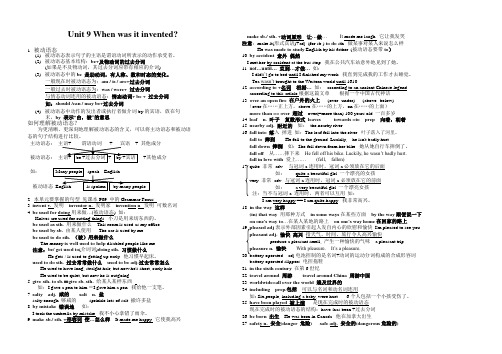
Unit 9 When was it invented?1. 被动语态(1). 被动语态表示句子的主语是谓语动词所表示的动作承受者。
(2). 被动语态基本结构:be+及物动词的过去分词(如果是不及物动词,其过去分词应带有相应的介词)(3). 被动语态中的be 是助动词,有人称、数和时态的变化。
一般现在时被动语态为:am / is / are+过去分词一般过去时被动语态为:was / were+ 过去分词与情态动词连用的被动语态:情态动词+ be + 过去分词如:should /can / may be+过去分词(4). 被动语态中动作的发出者或执行者做介词by的宾语,放在句末,by 表示“由,被”的意思如何理解被动语态?为更清晰、更深刻地理解被动语态的含义,可以将主动语态和被动语态的句子结构进行比较。
主动语态:主语+ 谓语动词+ 宾语+ 其他成分被动语态:主语+ be +过去分词+ by +宾语+其他成分如:Many people speak English.被动语态English is spoken by many people.2. 本单元要掌握的句型见课本P69 中的Grammar Focus3. invent v.发明inventor n.发明家invention n. 发明可数名词4. be used for doing用来做…(被动语态) 如:Knives are used for cutting things. 小刀是用来切东西的。
be used as sth.用来做什么This room is used as my office.be used by sb. 由某人使用The car is used by me.be used to do sth. (被)用来做什么The money is well used to help disabled people like me.注意:be/ get used to(介词词)doing sth. 习惯做什么He gets / is used to getting up early. 他习惯早起床。
人教版新目标英语九年级-Unit9单元知识点小结
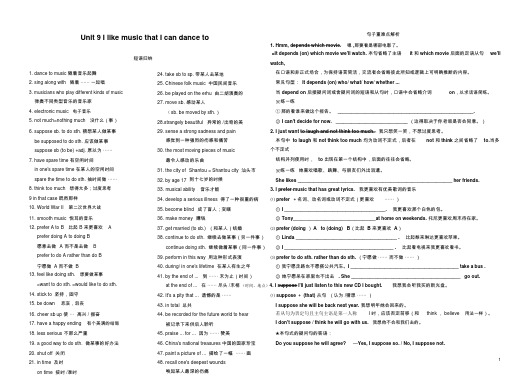
Unit 9 I like music that I can dance to句子重难点解析1. Hmm, depends which movie.嗯,那要看是哪部电影了。
=It depends (on) which movie we'll watch. 本句省略了主语it 和 which movie 后面的定语从句we'll 短语归纳watch,1. dance to music 随着音乐起舞2. sing along with随着⋯⋯一起唱3. musicians who play different kinds of music弹奏不同类型音乐的音乐家4. electronic music电子音乐5. not much=nothing much没什么(事)6. suppose sb. to do sth. 猜想某人做某事be supposed to do sth. 应该做某事suppose sb (to be) +adj. 原以为⋯⋯7. have spare time 有空闲时间24.take sb to sp. 带某人去某地25.Chinese folk music 中国民间音乐26.be played on the erhu 由二胡演奏的27.move sb. 感动某人(sb. be moved by sth.)28.strangely beautiful异常的/出奇的美29.sense a strong sadness and pain感觉到一种强烈的伤感和痛苦30.the most moving pieces of music最令人感动的乐曲在口语和非正式场合,为保持语言简洁,交流者会省略彼此所知或逻辑上可明确推断的内容。
常见句型: It depends (on) who/ what/ how/ whether ...当 depend on 后接疑问词或含疑问词的短语和从句时,口语中会省略介词on,以求话语简练。
(完整版)新版新目标英语九年级unit9知识点总结
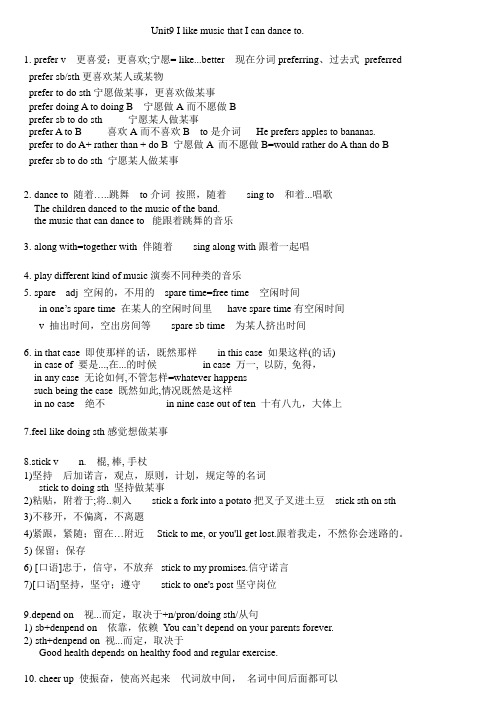
Unit9 I like music that I can dance to.1. prefer v 更喜爱;更喜欢;宁愿= like...better 现在分词preferring、过去式preferred prefer sb/sth 更喜欢某人或某物prefer to do sth 宁愿做某事,更喜欢做某事prefer doing A to doing B 宁愿做A而不愿做Bprefer sb to do sth 宁愿某人做某事prefer A to B 喜欢A而不喜欢B to是介词He prefers apples to bananas. prefer to do A+ rather than + do B 宁愿做A 而不愿做B=would rather do A than do B prefer sb to do sth 宁愿某人做某事2.dance to 随着…..跳舞to介词按照,随着sing to 和着...唱歌The children danced to the music of the band.the music that can dance to 能跟着跳舞的音乐3.along with=together with 伴随着sing along with 跟着一起唱4.play different kind of music 演奏不同种类的音乐5.spare adj 空闲的,不用的spare time=free time 空闲时间in one’s spare time 在某人的空闲时间里have spare time有空闲时间v 抽出时间,空出房间等spare sb time 为某人挤出时间6.in that case 即使那样的话,既然那样in this case 如果这样(的话)in case of 要是...,在...的时候in case 万一, 以防, 免得,in any case 无论如何,不管怎样=whatever happenssuch being the case 既然如此,情况既然是这样in no case 绝不in nine case out of ten 十有八九,大体上7.feel like doing sth感觉想做某事8.stick v n. 棍, 棒, 手杖1)坚持后加诺言,观点,原则,计划,规定等的名词stick to doing sth 坚持做某事2)粘贴,附着于;将..刺入stick a fork into a potato 把叉子叉进土豆stick sth on sth3)不移开,不偏离,不离题4)紧跟,紧随;留在…附近Stick to me, or you'll get lost.跟着我走,不然你会迷路的。
九年级英语unit9知识点总结

九年级英语unit9知识点总结英语是一门重要的语言,我们在学习过程中必须掌握各种知识点。
在九年级英语的学习中,Unit 9是一个重要的单元,本文将对这个单元的知识点进行总结。
1. 单词和短语这个单元中有许多重要的单词和短语,比如interview(采访),apply(申请),volunteer(志愿者),workshop(研讨会)等。
我们需要记住这些词汇的意思和用法,并学会正确地运用到对话和写作中。
2. 句型和语法在Unit 9中,我们学习了一些重要的句型和语法知识,比如宾语从句和否定副词的用法。
宾语从句在复合句中起到连接主句和从句的作用,我们要学会识别和运用宾语从句。
否定副词可以改变整个句子的意思,我们需要了解不同的否定副词的用法和规则。
3. 阅读理解Unit 9中有一些阅读材料,我们需要学会提取关键信息,理解文章的主旨和细节。
同时,我们也要锻炼自己的阅读理解能力,学会推理和推断,从文章中推测出作者的意图和态度。
4. 写作技巧写作是英语学习中的重要部分,Unit 9中我们学习了一些写作技巧。
比如,在求职信中我们要介绍自己的个人信息和优势,同时表达对该职位的兴趣和适应能力。
我们要学会运用恰当的语言和词汇来写作,并注意书写的格式和结构。
5. 听力技巧听力是英语学习的难点之一,Unit 9中我们要学会听懂一些面试和求职的对话。
我们可以通过多听一些实际对话,了解常用的表达方式和说话习惯。
同时,我们也要积极参与听力练习,提高自己的听力能力。
6. 课外拓展在学习Unit 9的过程中,我们还可以进行一些拓展。
比如,阅读相关的英语材料,了解不同国家和地区的求职和面试文化差异。
我们也可以参加一些模拟面试和写作比赛,提高自己的实际应用能力。
总之,九年级英语Unit 9的学习内容涵盖了单词和短语、句型和语法、阅读理解、写作技巧、听力技巧等方面。
我们要全面掌握这些知识点,通过反复练习和实践,提高自己的英语能力。
希望本文的总结对大家有所帮助。
新目标英语九年级unit9知识点

新目标英语九年级unit9知识点新目标英语九年级Unit 9知识点Unit 9 of the New Standard English textbook for ninth graders covers a wide range of interesting and important topics. In this unit, students will learn about history, culture, and global issues. Let's delve into the key points and concepts covered in this unit.1. Global Issues:The first part of Unit 9 focuses on global issues, such as climate change, pollution, and poverty. Students will explore the causes and effects of these problems and discuss possible solutions. This topic not only enhances students' English language skills but also helps raise awareness about these pressing issues.2. Environmental Vocabulary:To understand global issues better, students will learn a variety of vocabulary words related to the environment. The terms include deforestation, greenhouse gases, renewable energy sources, and sustainable development. These words will enable students to engage in discussions and express their opinions on environmental matters.3. Listening Skills:Unit 9 also emphasizes listening skills. Students will listen to recordings and answer comprehension questions to improve their ability to understand spoken English. Topics covered in the listening exercises include wildlife conservation, recycling, and environmental activism. By actively listening and responding, students can refine their comprehension skills.4. Reading Comprehension:Reading comprehension is an essential aspect of language learning. In this unit, students will read texts on diverse topics such as global warming, endangered animals, and efforts to combat pollution. By analyzing the texts and answering comprehension questions, students will enhance their reading skills and expand their vocabulary.5. Writing:Unit 9 includes a writing component in which students will be asked to compose various types of texts. This could range from opinion essays on global issues to persuasive letters advocating for environmental protection. The writing tasks aim to improve grammar, vocabulary, and logical thinking skills.6. Cross-cultural Understanding:Unit 9 also introduces students to different cultures and traditions from around the world. By exploring festivals, customs, and celebrations in different countries, students gain a broader perspective and develop empathy towards other cultures. This intercultural awareness fosters a sense of global citizenship.7. Grammar and Language Usage:Throughout this unit, students will also review and learn new grammar rules and language usage. Students will engage in activities that focus on verb tenses, prepositions, adjectives, and adverbs. These grammar exercises reinforce students' understanding of sentence structure and improve their communication skills.8. Speaking and Presentation Skills:Unit 9 provides opportunities for students to practice their speaking skills. They will participate in group discussions, debates, and presentations. These activities encourage students to express their opinions, listen to others, and develop their public speaking skills – all essential abilities for effective communication.9. Test Preparation:To wrap up Unit 9, students will review the concepts, vocabulary, and skills covered in the unit to prepare for assessments. This revision stage allows students to consolidate their learning and identify any areas that may require further attention.In conclusion, Unit 9 of the New Standard English textbook for ninth graders covers a wide range of topics that engage students and enhance their English language skills. With a focus on global issues, environmental vocabulary, listening and reading comprehension, writing, cross-cultural understanding, grammar, speaking, and test preparation, students are exposed to a comprehensive language learning experience. By the end of this unit, students will have gained new knowledge and skills to apply in their future studies and daily lives.。
新版新目标英语九年级unit9知识点总结
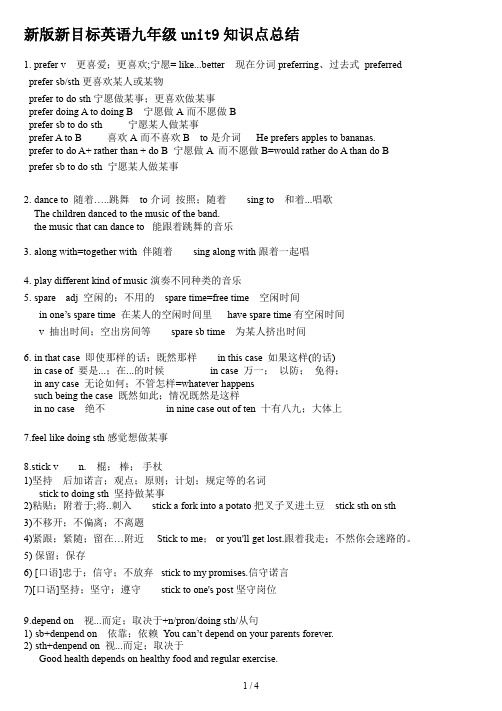
新版新目标英语九年级unit9知识点总结1. prefer v 更喜爱;更喜欢;宁愿= like...better 现在分词preferring、过去式preferred prefer sb/sth 更喜欢某人或某物prefer to do sth 宁愿做某事;更喜欢做某事prefer doing A to doing B 宁愿做A而不愿做Bprefer sb to do sth 宁愿某人做某事prefer A to B 喜欢A而不喜欢B to是介词He prefers apples to bananas.prefer to do A+ rather than + do B 宁愿做A 而不愿做B=would rather do A than do B prefer sb to do sth 宁愿某人做某事2.dance to 随着…..跳舞to介词按照;随着sing to 和着...唱歌The children danced to the music of the band.the music that can dance to 能跟着跳舞的音乐3.along with=together with 伴随着sing along with 跟着一起唱4.play different kind of music 演奏不同种类的音乐5.spare adj 空闲的;不用的spare time=free time 空闲时间in one’s spare time 在某人的空闲时间里have spare time有空闲时间v 抽出时间;空出房间等spare sb time 为某人挤出时间6.in that case 即使那样的话;既然那样in this case 如果这样(的话)in case of 要是...;在...的时候in case 万一;以防;免得;in any case 无论如何;不管怎样=whatever happenssuch being the case 既然如此;情况既然是这样in no case 绝不in nine case out of ten 十有八九;大体上7.feel like doing sth感觉想做某事8.stick v n. 棍;棒;手杖1)坚持后加诺言;观点;原则;计划;规定等的名词stick to doing sth 坚持做某事2)粘贴;附着于;将..刺入stick a fork into a potato 把叉子叉进土豆stick sth on sth3)不移开;不偏离;不离题4)紧跟;紧随;留在…附近Stick to me; or you'll get lost.跟着我走;不然你会迷路的。
- 1、下载文档前请自行甄别文档内容的完整性,平台不提供额外的编辑、内容补充、找答案等附加服务。
- 2、"仅部分预览"的文档,不可在线预览部分如存在完整性等问题,可反馈申请退款(可完整预览的文档不适用该条件!)。
- 3、如文档侵犯您的权益,请联系客服反馈,我们会尽快为您处理(人工客服工作时间:9:00-18:30)。
九年级新目标Unit9重点讲解1. They’re used for seeing in the dark.搭配:be used for…表示“被用来做……”,介词for表示目的和用途,后面接名词或动词-ing形式。
例如:Wood can be used for making paper.扩展:(1) be used as …表示“被用作……”,介词as意思是“作为”的意思,其后一般接名词,强调使用的工具及手段。
例如:This book can be used as a textbook.(2) be used by…表示“被……使用”,by后接动作的执行者。
例如:This kind of machine is used by farmers for getting in crops.农民们用这种机器来收割庄稼。
(3) be/ get used to doing sth. 表示“习惯做某事”例如:I am used to getting up early every day.(4) used to do sth. 表示“过去常常……;曾经……”例如:I used to be a teacher.练习:①A knife can cutting bread.A. be used forB. be used toC. be used byD. be used as②This kind of plant can animal food.A. be used forB. be used toC. be used byD. be used as2. I think the most helpful invention is the light bulb.例如:helpful是由名词help加上-ful后缀构成的形容词,意为“有帮助的”,类似的形容词还有:thank — thankful (感激的) wonder — wonderful (令人惊奇的) success — successful (成功的) beauty — beautiful (美丽的)翻译:当你写作业的时候,一定要仔细点。
3. The potato chips were invented by mistake.讲解:(1) potato chips是一个复合名词,其中第一个名词用作定语修饰后一个名词,这样的例子有很多,又如: alarm clock, telephone number等。
扩展:复合名词变复数的规则a. 通常只把主体名词变为复数例如:school boy — school boys (男生) girl friend — girl friends(女朋友)vegetable sandwich — vegetable sandwiches (蔬菜三明治)b. 如果没有主体名词,在最后一个名词上用复数例如:three-year-old — three-year-olds(三岁的孩子)c. 由man, woman和另外一个名词构成的复合名词,两个部分都要用复数例如:man teacher — men teachers (男教师)woman doctor — women doctors (女医生)翻译:你家花园里有多少棵苹果树啊?练习:①Many students are interested in playing .A. computer gamesB. computers gamesC. computer gameD. computers game②There are many in our school. They are all good at .A. woman teacherB. woman teachersC. women teacherD. women teachers(2)by mistake 表示“错误地(因粗心、遗忘等所致)”例如:Sorry, I took your bag by mistake. 对不起,我错拿了你的手提包。
扩展:mistake ... for “错把……当作……”例如:She is often mistaken for a famous singer.练习:昨天我错把你的作业拿走了。
4. George Crum cooked them for a long time until they were crispy.讲解:until常用作介词或连词,用来引导介词短语或从句在句子中作时间状语。
(1) 在肯定句中,until与延续性、持续性动词连用,表示“直到……为止”。
例如:I worked until late in the afternoon. 我一直干到下午很晚的时候。
(2) 在否定句中,until常与瞬间动词、短暂性动词连用,表示“直到……才……”。
例如:The rain didn’t stop until/ till midnight.I won’t leave until/ till you promise to help me.注意:当until用于句首时,一般不能用till代替;在以not开始的从句或短语里,until 一般也不能用till代替,而且这种句式要用倒装语序。
例如:Until the last minute of the match we kept playing.Not until 10 o’clock did he go home.翻译:昨天我妈妈知道9点才回来。
5. Some leaves from a nearby bush fell into the water and remained there for some time.搭配:(1) fall into在这里是“落入、陷入”的意思。
例如:Some ash fell into my cup. 一些灰掉进我的杯子里了。
扩展:fall into有时也可以作“开始”解。
例如:He fell into conversation with me. 他开始和我谈起话来。
(2) remain意为“留下,剩下;保持不变”既可用于行为动词,又可作系动词使用;还可作名词,常用于复数,用法如下:a. remain (n.)/ to do例如:He remained a prisoner for the rest of his life.It sounds a good idea, but it remains to be seen whether it will succeed.b. remain 接介词短语例如:She remains in the house all these days.c. remain + (adj.),此时作为系动词例如:He remained poor all his life.6. And in this way, one of the world’s favorite drinks was invented.搭配:本句中的in the way意为“就这样”,“以这种方式”。
例如:The song was composed in this way.In this way, you will find the answer to this question.扩展:way主要有以下几种用法:a. way to do sth = way of doing sth 意为“做某事的方法”。
例如:Scientists are trying to find ways to prevent (of preventing) disease.There are many ways of traveling (to travel).b. in that way意为“用那种方法”例如:Can I explain the sentence in that way?c. in the way有两个意思:一是“妨碍,挡道”;二是“以……的方式”例如:Her social life got in the way of her studies.He likes to study in the way his father has taught him when he was young.d. by the way意为“顺便说一声,顺便问一下”例如:Oh, by the way, have you heard from Bill recently?e. on the/ one’s way to表示“在……路上”,后面接宾语(地点名词)时加to;接地点副词(here, there, home)时则不加to。
例如:I’m on my way home.我正在回家的路上。
She’s on her way to her school.练习:①Don’t worry, Marry. Your husband is here. There is too much traffic at present.A. in the wayB. on the wayC. by the wayD. in this way②, is everyone here now? The meeting will begin.A. in the wayB. on the wayC. by the wayD. in this way7. It is believed that on December 21 st, 1891, the first basketball game in history was played.讲解:本句中的It is believed that... 相当于people believe that...是“人们相信/认为”的意思。
例如:It is believed that by the year 2010, the population of the world will be seven billion.= People believe that by the year 2010, the population of the world will be seven billion.扩展:a. believe意为“相信”,“认为”,一般表示相信某人是诚实的或某事是真实的,后面可以接名词、代词、从句或复合结构作宾语。
例如:I just could not believe my eyes.Scientists believe that whales can live for twenty to thirty years.b. believe可以用于被动语态。
